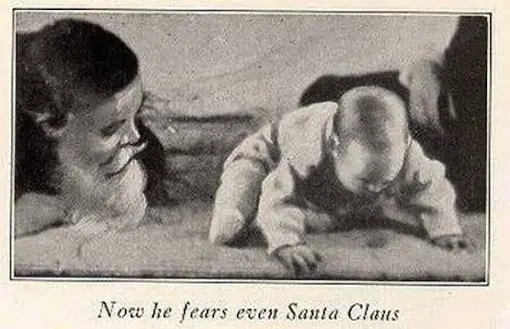
The Heartbreaking Fate Of ‘Little Albert’: Child Subject Of Historic Study Died At Just Six

The infant at the heart of one of psychology’s most controversial experiments—now seen as a clear example of “medical misogyny”—was Little Albert. This baby, who developed an intense fear of anything furry just six years after the study, was unidentified for many years.
In the 1890s, Russian neurologist Ivan Pavlov discovered that dogs exhibited conditioned learning, or conditioned reflex, when they salivated in response to the sound of a bell, associating the noise with food. Pavlov’s groundbreaking work had a profound influence on the development of behaviorism, a psychological theory that suggests all behaviors are learned through conditioning processes.
In simple terms, this theory argues that our actions are shaped by the environment more than our internal thoughts or feelings, with learning based on associations, rewards, and punishments.
The Baby Experiment
John B. Watson, widely regarded as the founder of behaviorism, was heavily influenced by Pavlov’s work and decided to test the concept of conditioned reflexes—specifically fear reactions—on a 9-month-old infant in 1920.
Watson and his colleague, Rosalie Rayner, described Little Albert as "one of the best developed youngsters" ever brought to the hospital, weighing 21 pounds at nine months of age. They noted that he was "stolid and unemotional," traits that made him a suitable subject for their experiment. "We felt that we could do him relatively little harm by carrying out such experiments," they explained.
Feared Santa
Initially, Albert responded to soft, harmless animals like a white rat and a rabbit with playful curiosity. According to Watson, "At no time did this infant ever show fear in any situation." Albert rarely cried, and he seemed emotionally stable.
However, the twist came when Watson and Rayner paired Albert's interactions with the rat with the sound of a hammer hitting a steel pipe. The loud noise caused Albert to recoil and cry. After several repetitions, Albert’s initially lighthearted interest in the rat transformed into sheer terror, and he began avoiding anything resembling the rat, including Santa Claus' fluffy white beard, a dog, a rabbit, or even a wool coat.
This was an example of Pavlovian conditioning, but instead of drooling dogs, the experiment involved a frightened infant. Watson presented the study as proof of his belief that all emotional responses—fear, rage, and love—are rooted in basic, innate reactions.
Behind the Scenes
Despite the experiment’s alarming nature, Little Albert, being a newborn, was unable to consent. Moreover, Watson did not inform the baby’s mother about the distressing nature of the experiment. When she realized what was happening, she removed Albert from the study. Despite Watson and Rayner’s promise to "decondition" Albert’s fear, they never followed through.
Little Albert’s True Identity Revealed
For decades, Little Albert’s identity remained unknown, as Watson did not document his name. However, in 2009, a determined group of psychologists uncovered the truth, concluding that Little Albert was most likely Douglas Merritte, the son of a wet nurse at Johns Hopkins Hospital. Using facial recognition and medical records, they confirmed the infant's identity.
The discovery revealed the tragic news that Douglas had passed away from hydrocephalus, a condition in which fluid accumulates in the brain, just six years after the experiment.
Before being placed in front of the white rat, baby Douglas had suffered from meningitis and showed signs of developmental issues. "He has a very large head, and he’s quite pudgy and short, but the head is still big for a pudgy, short infant," Dr. Alan Fridlund, a social and clinical psychologist, noted when examining the baby’s health.
Furthermore, Fridlund observed that during the film documenting the experiment, which showed Albert for only a few minutes, the baby did not display any social smiles. "Not once in the film, despite being shown an Airedale dog running around or a monkey on a leash, does Albert seek support from Watson or Rayner," Fridlund said. "Typically, when infants perceive a threat, they turn to a caretaker for comfort."
Flawed Foundation
The Little Albert experiment left a lasting impact, despite its dubious scientific basis and questionable ethics. Over time, Watson’s account of the experiment became increasingly unclear, yet he continued to base his career on his audacious claims about human nature.
Today, many psychologists believe the experiment was built on a flawed foundation, perhaps even exploiting a child with pre-existing neurological issues. "Because Watson and Rayner attempted to condition fear in an infant without following up to ensure his well-being, the Little Albert study has always raised concerns about experimental ethics," Dr. Fridlund said in an article for the American Psychological Association. "But now it forces us to confront deeper, more disturbing issues, such as medical misogyny, the protection of the disabled, and the potential for scientific fraud."
Douglas Merritte, known as Little Albert, was more than just an experimental subject. His short and tragic life serves as a stark reminder that compassion must always take precedence over knowledge.
News in the same category


The real reason why nobody has ever found human remains inside the Titanic wreckage

1,000-year-old onion and garlic eye remedy kills MRSA

The Simpsons fans devastated as show 'kills off' one of the main characters for first time ever

NASA releases closest-ever images to the sun and everyone is asking the same thing

Secret CIA Documents Declare That The Ark Of The Covenant Is Real, And Its Location Is Known

Scientists Warn China-Identified Bat Virus Just One Mutation Away From Sparking Global Pandemic

EventsCalifornia On High Alert After Invasive Crab Capable Of Scaling 13-Foot Walls Discovered

Coca‑Cola Fires Back After Trump Claims He Switched The Coke Recipe

Modified Herpes Virus Shrinks Advanced Melanoma Tumors in Trials, Offering Fresh Hope Against Stubborn Skin Cancer

People are just realizing insane coincidence that links The Matrix and 9/11 tragedy

Former NASA boss makes heartbreaking admission about the future of US space travel

Why You Should Disconnect Your WiFi at Night And Sleep With Your Phone on Airplane Mode in Another Room

Farmer Plants 1,000 Oak Trees to Create Memorial for Late Wife

TV Star Claps Back at Trolls Over Her Māori Face Tattoo

Insane amount of money viral 'Storm Area 51' stunt cost the US military

Scientists explain 'puzzling blob' heading straight for New York City that's hidden 200 kilometers below our feet

Inside the Life of Australia’s Largest Clan: The Bonell Family

Guy Mocked for Dating 252-lb Woman
News Post

Proven Inflammatory Foods to Avoid According to Science

A Quiet Act of Kindness That Restored My Faith in Humanity.

Proven Health Benefits of Matcha Green Tea: Weight Loss, Cancer and More (Evidence Based)

A Boy Named Shayden Just Wanted One Thing: A Friend — Can We Help?

Waking Up with Numb or Tingling Hands: What It Really Means (Science Based)

My MIL Kicked My 6-Year-Old Daughter Out of My Nephew’s 7th Birthday Party – When I Found Out Why, I Had to Teach Her a Lesson

One Day My FIL Snapped, 'Did You Forget Whose House You're Living In?' — I Felt Humiliated and Had to Str!ke Back

Amazon's forgotten $500,000,000 deal that 'killed' Toys 'R' Us in 'cruel' move

The real reason why nobody has ever found human remains inside the Titanic wreckage

My Parents Kicked Me Out for Refusing to Attend Their Dream College — Five Years Later, They Got a Lesson They’ll Never Forget

I Thought My Daughter Was Just Going Through a Phase, but Her Journal Exposed a Truth I Wasn't Ready for – Story of the Day

Scientists Reverse Aging of a 53-Year-Old’s Skin Cells to That of a 23

Thyroid Gland: How to Balance Its Hormones

Gluten Intolerance Warning: Eczema and Other Hidden Signs Revealed

Your Body Is Begging You to Notice These High Blood Sugar Warnings

Research Reveals 12 Powerful Foods to Boost Your Brain, Improve Memory, and Make You Smarter

The Dog Who Never Ran Away Again.

Officer’s Quick Fix Turns Routine Call into a Viral Moment of Kindness.

My son brought a psychiatrist home to have me declared legally incompetent.
